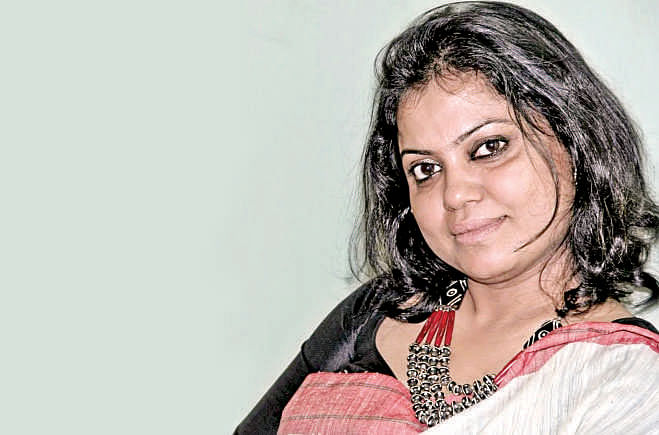Ten Things You Didn't Know About <br>SHAHNEOYAJ CACOLY
Ten Things You Didn't Know About <br>SHAHNEOYAJ CACOLY

What inspired you to become a director?
Actually, I wanted to become a painter. Simultaneously, I developed a passion for camerawork, light and sound since I was a teenager. I was involved in art direction during my academic life. After I completed my masters from Fine Arts in 2007, I suddenly felt that I have a few ideas in my head which I needed to develop. Azizur Rahman, my mentor, came to know my ideas regarding scripts and direction, and inspired me to work as a director in mainstream films. Since I had my education in composition and art, I have been able to use my academic knowledge as a director.
What was your first production as a director?
My first direction was 'Sang Ulipur (The Destination)', a story of a rickshaw puller. It was in 2006 and the story clicked the audience's mind with much success. Later on, I directed two telefilms named 'Ujan Ponthe' and 'Onek Kartik, Ekti Agrohayon'. After I worked on 'Onek Kartik, Ekti Agrohayon', which was based on the devastation of North-Bengal, I did not have to look back.
What is your favorite production of all time?
I watch a lot of movies and television shows. It is tough to name few particular movies. However, I like the work of Mel Gibson a lot. I consider his movie 'The Passion of the Christ' one of the best. Besides, the costume and color work in his movie named 'The Apocalypto' is beyond judgment. A 1931 silent movie named 'Tabu' by F.W. Murnau is a wonderful movie as well. In our country, we had lot of good movies in our golden period – the 1980's. I think movies like 'Nolok', 'Matir Ghor', 'Chutir Ghonta', 'Bhat De' and 'Lathiyal' are very good movies of Bangladesh.
Who have you enjoyed working with the most?
It always helps me learn things from our senior artists since they are very punctual, sincere, accountable and dedicated to their work. They maintain their time schedule and deliver their utmost labor to make a production successful. Mamunur Rashid, Jayanto Chattopaddhay, Dilara Zaman and Syed Shamsul Haque are amongst my list of favourite actors who I have had the pleasure to work with.
What is your opinion about young artists?
I often face difficulties with young artists. They are sometimes downright rude and pay less attention to their craft. Besides, they are often also not professional or sincere. It is very frustrating that they are rude and arrogant at times. When I was working on 'Uttorer Shur (Northern Symphony)', I faced a lot of problems with a young artist.
What are some of the common challenges you face as a director in Bangladesh?
I think we have been unable to grow a professional outlook here. Starting from the technical managers to the actors and large production houses and everyone involved in this media industry are not professional in their behavior and attitude. When I say professional, I understand punctuality, dedication and accountability. We do not employ our full labor and concentration to the production. The use of mobile phones and tabs inside shooting sets breaks concentration and leads to embarrassment. There are many other problems in our industry such as the lack of commitment to the role, telling lies, nepotism and many others.
In your opinion, what are the most important things missing from the overall media today?
The most frustrating thing is that we have lost the diversity in scripts which can portray the complexity of urban life and the simplicity of rural life as well. The stories of our media industries are similar to popular stories of other cultures. It is due to the shift of our focus from rural to urban life. Consequently, the diversity in storytelling or representation has lost its charm. I would say that we have lost our aesthetic mind and uniqueness. Therefore, we have borrowed the costume and makeup of other cultures. Theoretically speaking, the moment we emphasized adorning our outer appearance, our artistic mind began to diminish.
How to improve the situation then? What do we need to do improve the scenario?
The urgency of a television and media study institute is crucial today. People are often going for television production before they start with movies. If we had an institute like this, the media enthusiasts would be benefitted. We need to make sure that we maintain our own cultural identity in scripts and diversity in representation. Prior to all, practice of literature can open our mind and make it adaptive to every situation. We can blend things together in need if we have open minds. Besides, introducing technical support centers can improve our quality of production.
What is your advice for those who want to enter the world of making television dramas?
I would suggest maintaining a professional outlook. Besides, Dedication and hard work can help a lot. Maintaining aesthetic value in production and diversity in representation is important for success. Watching movies of different producers and directors helps understand the camerawork, light and sound.
Where do you see yourself ten years from now? Do you always want to be a director?
It is a tough question since I don't know the future. However, I would like to stick to direction and movie making. Besides, as you know I write scripts, I would like to go on writing as well.